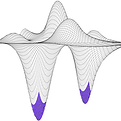Quantum Optimization
Empowering Industries with the Practical Benefits of Quantum Computing
Optimization Problems
Combinatorial optimizations are prevalent across various fields, such as finance, telecommunications, manufacturing, robotics, vehicle routing, logistics, government, and more. They address a wide range of real-world challenges encountered in everyday life, engineering, and science, and are widely applied in areas such as AI and ML.
Combinatorial Optimizations
Combinatorial optimization focuses on finding the best solution within a discrete solution space. Common examples of combinatorial optimization problems include the Traveling Salesman Problem (TSP), the Minimum Spanning Tree Problem (MST), and the Knapsack Problem. These problems involve vast solution spaces, making exhaustive search methods impractical in most cases. Specialized algorithms and approximation methods are essential to address these challenges effectively. Finding optimal or near-optimal solutions represents a significant challenge in both theoretical research and practical real-world applications.
Computational Complexity
Combinatorial optimization problems are akin to finding a needle in a haystack, as they involve identifying the best solution among a vast number of feasible solutions, often represented as permutations. The size of the 'haystack' grows exponentially with each additional variable, making it increasingly challenging to efficiently find optimal or near-optimal solutions using classical computing algorithms. For example, determining the most valuable combination of only 40 items from a set of 100 involves navigating the knapsack space, which is millions of times larger than the total number of stars in the universe (the rough estimate of stars in the observable universe is 10 to the power of 22).
Real-World Applications
Combinatorial optimization challenges have widespread implications across industries. They directly impact organizations' abilities to optimize resources, improve efficiency, and drive innovation:
In finance, optimization challenges arise in portfolio management and liquidity optimization. The number of potential portfolio configurations increases exponentially with the number of assets.
In logistics, optimizing delivery routes within supply chain networks involves navigating numerous potential schedules and routes.
In healthcare, personalized medicine and drug discovery face an enormous search space for potential treatment plans or compound combinations.
Quantum Advantage
Quantum computing introduces a transformative computational paradigm, promising exponential speed-ups in various applications such as quantum chemistry simulations, prime factorization, and solving linear systems. Moreover, quantum computing has the potential to transform businesses, unlocking substantial value across industries by solving complex combinatorial optimization challenges.

Quantum Formulation
A mathematical formulation called QUBO (Quadratic Unconstrained Binary Optimization) provides a structural framework and serves as the foundation for formulating combinatorial optimization problems in quantum computing. In recent years, it has been demonstrated that the QUBO model encompasses various combinatorial optimization problems, addressing real-world applications across diverse industries.

Quantum Solvers
Quantum solvers find optimal or near-optimal solutions for combinatorial optimization problems by leveraging quantum interference and entanglement to achieve computational speedups and address complex challenges that are overwhelming for traditional classical computing methods. The future availability of a larger number of error-free qubits (quantum bits) promises large-scale industrial optimization that can surpass the capabilities of most classical supercomputers.

Quantum-Inspired Solvers
Quantum-inspired solvers leverage quantum behavior to enhance classical heuristic approaches. By drawing from principles such as quantum superposition and entanglement and utilizing the QUBO model, these techniques efficiently explore vast solution spaces, significantly increasing the likelihood of finding optimal or near-optimal solutions. While fault-tolerant quantum computers are still in development, quantum-inspired solvers provide immediate performance gains, offering industry-ready computational solutions.
